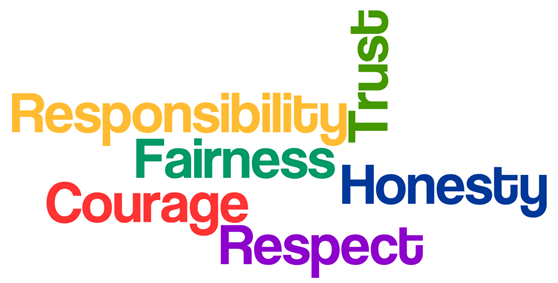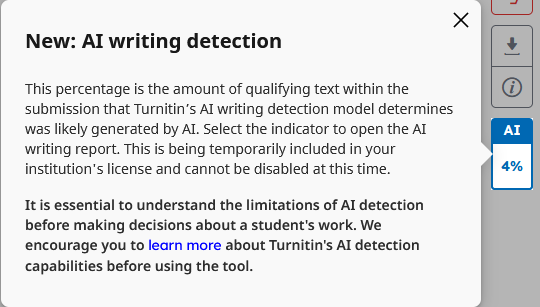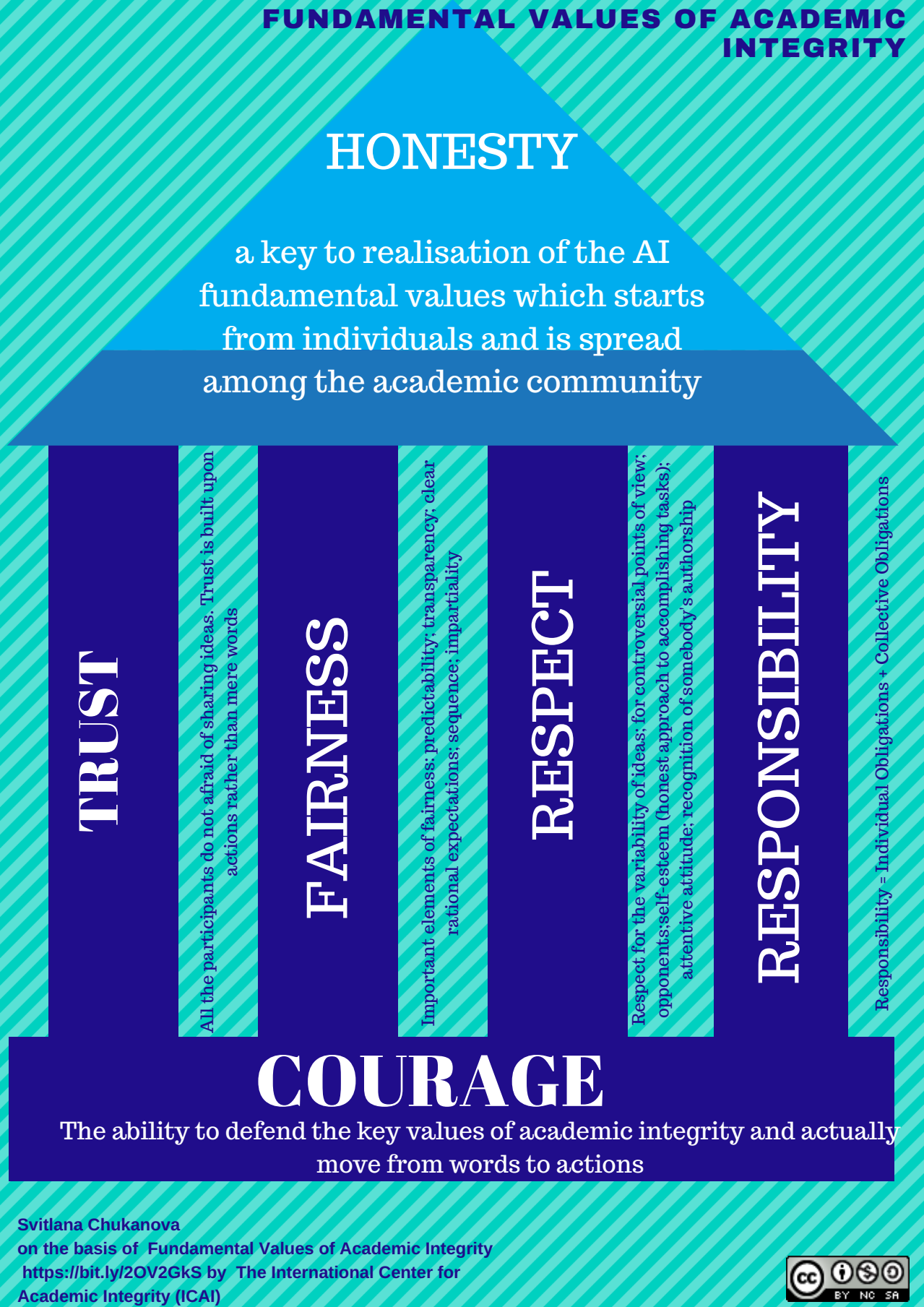Academic Integrity Resource for Students
| Site: | eLearning @ CILT (2023) |
| Course: | eLearning @ CILT (2023) |
| Book: | Academic Integrity Resource for Students |
| Printed by: | |
| Date: | Saturday, 14 February 2026, 7:32 PM |
Description
Introduction to academic integrity and the values that students, scholars and educators should ascribe to.
Table of contents
- 1. What is Academic Integrity?
- 2. Values of Academic Integrity
- 3. Honesty
- 4. Trust
- 5. Fairness
- 6. Respect
- 7. Responsibility
- 8. Courage
- 9. Course 1 on Academic Integrity
- 10. Course 2 on Academic Integrity
- 11. Academic Integrity FAQs
- 12. Turnitin Similarity Reports
- 13. Turnitin and AI
- 14. Academic Integrity Values Poster
1. What is Academic Integrity?
To define Academic Integrity, let's break the concept down:
- Integrity refers to the quality of being honest and having strong moral principles
- Academic is anything relating to education and scholarship
2. Values of Academic Integrity
Academic Integrity, according to the International Centre for Academic Integrity has six fundamental values, namely: honesty, trust, fairness, respect, responsibility, and courage.

3. Honesty
The quality of being honest, free from fraud or deception, legitimate, truthful.
Honesty means being truthful and sincere, as well as acting in ways that
are fair and free from deceit. Honesty begins with individuals and
extends to the larger community. To seek knowledge and grow from that
knowledge, we must be honest with ourselves and each other. Cultivating
and practicing honesty lays a foundation for lifelong integrity.
How do you demonstrate HONESTY in your academic work? [2]
- Being truthful
- Giving credit to the owner of the work (i.e., musician, author, artist, speaker etc.)
- Keeping promises
- Providing factual evidence
- Aspiring to objectivity, consider all sides and one's own potential preconceptions
4. Trust
Trust refers to the assured reliance on the character, ability, strength, or truth of someone or something.
Trust entails a belief in the reliability, truth, ability or strength of someone or something. Trust is a necessary foundation of academic work. Trust enables us to collaborate, share information and circulate new ideas without fear that our work will be undermined or stolen, or our careers or reputations diminished.
How do you demonstrate TRUST in your academic work? [3]
- Clearly state expectations and follow through
- Promote transparency in values, processes, and outcomes
- Trust others
- Give credence
- Encourage mutual understanding
Act with genuineness
5. Fairness
Fairness is the quality or state of being fair, especially fair or impartial treatment, lack of favoritism toward one side or another.
Fair treatment is essential to an ethical community. Important components of fairness include reasonableness, transparency, impartiality and just treatment. We are fair to each other and to the community when we act with honesty and do our own work. We are fair to authors and writers when we acknowledge borrowed ideas, words and work. We are fair to the academic community when we respect and uphold academic standards and practices.
How do you demonstrate FAIRNESS in your academic work? [4]
- Apply rules and policies consistently
- Engage with others equitably
- Keep an open-mind
- Be objective
- Take responsibility for your own actions
6. Respect
Respect refers to high or special regard, esteem; the quality or state of being esteemed.
Respect is a feeling of admiration for someone or something based on abilities, qualities or achievements. Mutual respect means valuing others as you would like them to value you. In academic communities, respect means showing that you care about the opinions, reputation and well-being of the academic community.
How do you demonstrate RESPECT in your academic work? [5]
- Practice active listening
- Receive feedback willingly
- Accept that others’ thoughts and ideas have validity
- Show empathy
- Seek open communication
- Affirm others and accept differences
- Recognize the consequences of our words and actions on others
7. Responsibility
Responsibility refers to the quality or state of being responsible; moral, legal, or mental accountability; reliability, trustworthiness.
Being responsible means standing up against wrongdoing, resisting negative peer pressure, and serving as a positive example.Responsible individuals hold themselves accountable for their own actions, and work to discourage misconduct by others. For members of the academic community, this means safeguarding integrity, scholarship, teaching and research.
Responsible students seek to obtain and understand information about classroom and institutional policy. They follow these policies and ask questions when they do not understand or disagree with them.
How do you demonstrate TRUST in your academic work? [6]
- Hold yourself accountable for your actions
- Engage with others in difficult conversations, even when silence might be easier
- Know and follow institutional rules and conduct codes
- Create, understand, and respect personal boundaries
- Follow through with tasks and expectations
- Model good behavior
- Responsibility refers to the quality or state of being responsible; moral, legal, or mental accountability; reliability, trustworthiness.
8. Courage
Courage is the mental or moral strength
to venture, persevere, and withstand danger, fear, or difficulty.
Courage
is an element of character that allows students to commit to the
quality of their education by holding themselves and their fellow
learners to the highest standards of academic integrity – even when
doing so involves risk or prompts negative consequences from peers. Being courageous means acting in accordance with one’s convictions.
Being courageous means acting in accordance with one’s convictions. Like intellectual capacity, courage can only develop in environments where it is tested. Academic communities of integrity, therefore, necessarily include opportunities to make choices, learn from them, and grow. Through this iterative process, courage and the five additional values of academic integrity can develop as interwoven and mutually dependent characteristics.
Students who exhibit courage hold themselves and their fellow learners to the highest standards of academic integrity even when doing so involves risk of negative consequences, such as a bad grade, or reprisal from their peers or others.
- Be brave even when others might not
- Take a stand to address a wrongdoing and support others doing the same
- Endure discomfort for something you believe in
- Be undaunted in defending integrity
- Be willing to take risk and risk failure
9. Course 1 on Academic Integrity
This free open course is offered by the University of Waterloo. In this module, you will be given the opportunity to consider the implications of integrity in your academics and beyond. The intention is to help you understand the basic values of integrity, in hopes that you will strive to apply these values in your coursework, your co-op, and in your everyday life.
<<Academic Integrity Module>>
10. Course 2 on Academic Integrity
This free course, All my own work: exploring academic integrity, is designed to help you build confidence in producing your own work for academic purposes. You will explore what plagiarism is and how to avoid it, and learn how and when to reference. The course also includes an interactive to work through, which will help you to identify the potential temptations and challenges you may face when working on assignments.
<<All my own work: exploring academic integrity>>
11. Academic Integrity FAQs
These may be some of the Frequently Asked Questions about Academic Integrity zthat you may also have.
Academic Integrity FAQs
12. Turnitin Similarity Reports
Turnitin is a text-matching software that a lot of institutions use to aid the process of detecting possible plagiarism. Turnitin and all other similar software do not detect plagiarism per se, but they flag areas of your work that are similar to other sources on the Internet, on Turnitin databases or on other data sources used by the software. The software therefore serves as support for lecturers and students to identify areas of academic work that may have been plagiarised.
How do you interpret and understand the Turnitin similarity reports?
13. Turnitin and AI
Recently discussions on the use of AI (Artificial Intelligence) to do academic work have been dominating academia. ChatGPT has particularly made waves on discussions on AI in academic work. Naturally, you would be wondering on whether AI generated work can be detected by Turnitin.
Firstly, from an ethical point of view, any work that you submit which was not your own effort, but someone else's or something's else's effort, including AI, can be considered plagiarism because it is NOT your original work (AI synthesises content from various data sources, from content previously created by other people). If you use the assistance of AI or other entities, from an honesty principle, you must not only acknowledge it, but you also need permission from your lecturer/ supervisor to establish if you can use AI, in which context and to what degree.
Secondly, YES, Turnitin has a feature that flags content that shows patterns of having been created with AI (see below). Therefore you are urged to be honest and use your own effort to complete academic work, and seek your lecturer's guidance and support when struggling.

